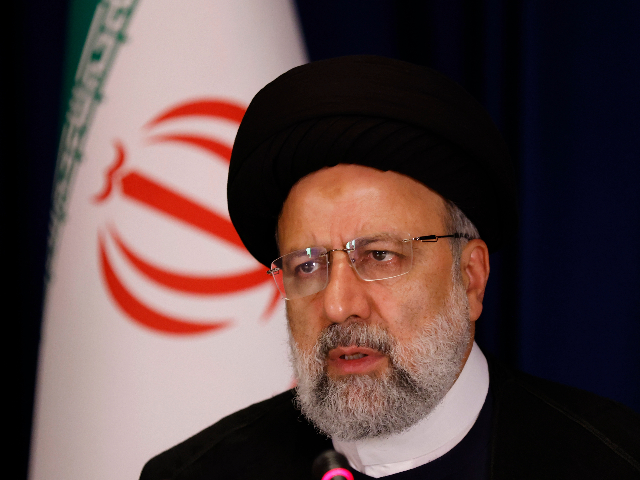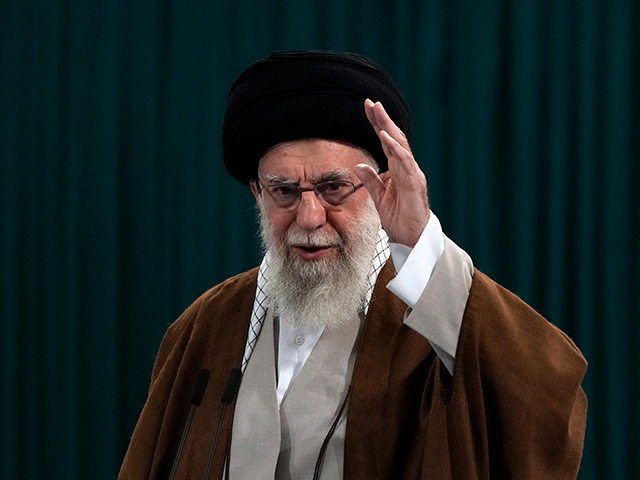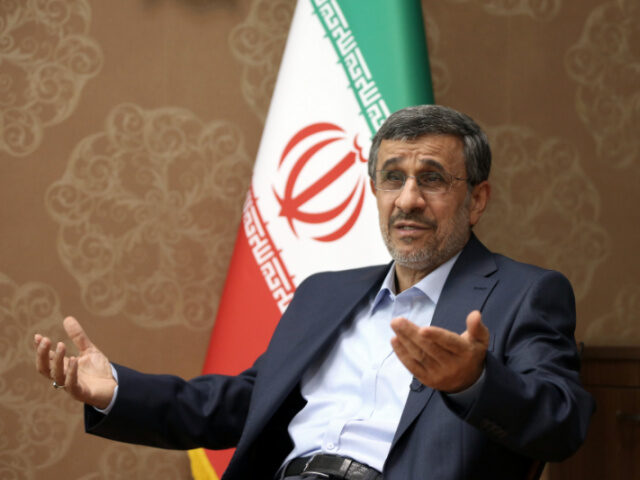Former Iranian President Mahmoud Ahmadinejad lit a firestorm on social media last week by refusing to wear black during the mourning period for President Ebrahim Raisi; he then got into a vicious online feud with a prominent state media reporter named Ameneh Sadat Zabihpour over the snub.
Raisi was killed in a helicopter crash on May 19, along with Foreign Minister Hossein Amir-Abdollahian and several other high-ranking officials. The Iranian regime declared five days of mourning for Raisi, culminating in his funeral on Thursday.
On the Tuesday after Raisi’s death, Iran convened a scheduled meeting of its Assembly of Experts in Tehran. The assembly is one of several governing councils that give the regime a vague illusion of representative government and careful deliberation but, in fact, are controlled by the theocratic supreme leader, who has total control over the State and much of Iran’s national wealth.

President of Iran Ebrahim Raisi speaks during a news conference, Wednesday, Sept. 20, 2023, in New York (AP Photo/Jason DeCrow).
The Assembly of Experts is a secretive council with 88 members who meet once a year. One of its duties is rubber-stamping the supreme leader for another eight years in power, until he either dies or retires, at which point the Assembly of Experts confirms his replacement. The Iranian theocracy has only had two supreme leaders since it came to power in a 1979 coup: Ayatollah Ruhollah Khomeini and his protege, Ayatollah Ali Khamenei, who took power after Khomeini’s death in 1989 and rules to this day at the age of 80.

Iranian Supreme Leader Ayatollah Ali Khamenei waves to media after he voted for the parliamentary runoff elections, in Tehran, Iran, Friday, May 10, 2024 (AP Photo/Vahid Salemi).
One of the 88 current members of the Assembly of Experts is former President Mahmoud Ahmadinejad, an erratic individual who often stirs up controversy on social media. Ahmadinejad fell out of favor with the clerics who rule Iran near the end of his presidency, which lasted from 2005 to 2013.
Pushed to the margins after losing a power struggle, he attempted to mount comebacks in 2017 and 2021 but was disqualified from running for the presidency both times, despite his habit of ostentatiously registering his candidacy with mobs of howling supporters to show the regime he remains influential.
Ahmadinejad was rumored to be considering another run for the office before Raisi’s death and has expressed interest in running in the snap election that must be held within 50 days. He would most likely be disqualified again, although some observers wonder if he might have grown strong enough as a populist firebrand to make the regime nervous about dismissing his candidacy out of hand.
Ahmadinejad showed up on Tuesday for the opening ceremony of this year’s Assembly of Experts meeting, which received extraordinary attention because of Raisi’s death and Khamenei’s deteriorating health, leaving the regime with two succession crises to manage. Most of the attendees wore black suits or shirts to honor Raisi’s passing, but not Ahmadinejad, who chose a white shirt instead:
Ahmadinejad’s snub of Raisi was noted and denounced by his political opponents and by Zabihpour, who blasted him on social media.
“Having been a reporter for your programs for eight years, I loathe you! Worthless!” she said, referring to her time as part of the state media apparatus during Ahmadinejad’s presidency.
Zabihpour was sanctioned by the U.S. Treasury Department in November 2022 as an “interrogator-journalist,” a senior employee of Islamic Republic of Iran Broadcasting (IRIB), which has “broadcast hundreds of forced confessions of Iranian, dual national, and international detainees.” She personally participated in a number of these forced confession broadcasts, most recently focusing her reports on the oppressed Baha’i community and protesters who rose up after the killing of Mahsa Amini by the regime’s “morality police.”
One of Ahmadinejad’s allies, a lawyer named Ali Hosseini, fired back by suggesting a moment of impropriety earlier in Zabihpour’s career. He implied that Amhadinejad regretted giving her a free pass for scandalous behavior when she traveled with him to the United States during his presidency.
“I wish, on that morning at the Warwick Hotel in New York, [Ahmadinejad] hadn’t snapped at the guards, dismissing it as irrelevant that a specific reporter had spent the night in a specific photographer’s room,” Hosseini said.
Hosseini was probably referring to news photographer Rouzbeh Jadidoleslam, who was often part of the press team for Ahmadinejad’s trips abroad and is close friends with Zabihpour. The two often refer to each other in public by their first names, which is considered somewhat improper between men and women under the hardline Islamist regime.
Jadidoleslam certainly thought he was targeted by the insinuation because he lashed out with his own social media post labeling Hosseini a “fraud and charlatan.” He then dared Hosseini to “demonstrate his integrity by releasing a photo of his travel visa.”
The clash widened over the weekend as allies and critics of both Ahmadinejad and Zabihpour joined the fray, lobbing various insults and accusations at one another. Some of Zabihpour’s critics needled her for allegedly having an affair while simultaneously posing as an Islamic morality enforcer and televising forced confessions from Amini protesters, a practice that technically violates Iranian law in addition to being a crime against humanity.
“Our repulsion towards Ameneh Sadat Zabihpour and the vile quagmire she and others like her have sunk into shouldn’t make me forsake the principles of [the] ‘Women, Life, and Freedom’ movement, which constitutes the most fundamental right of a woman over her body,” educational expert and activist Sara Omatali, said.
“Women, Life, Freedom” was the slogan of the Amini uprising, so Omatali was trying to express the conflict felt by activists opposed to Iran’s medieval treatment of women, but felt queasy sticking up for the feminist rights of Zabihpour because she is an energetic enforcer of Tehran’s misogynist agenda.
“There are countless reasons to disgrace Ameneh Sadat,” Omatali declared, implying that Zabihpour’s possible romantic relationship with Jadidoleslam should not be one of them.
Zabihpour and Hosseini eventually deleted their feuding posts on Twitter but the controversy lingers, which might please the gleefully disruptive Ahmadinejad even if he would not normally regard the Amini movement as a political ally.
Ahmadinejad seems to be almost daring the regime to crack down on him or disqualify him once again from running in the snap election to replace Raisi, a bold move considering one of his opponents in the election could be Supreme Leader Khamenei’s son.

COMMENTS
Please let us know if you're having issues with commenting.